Can chickens taste spicy foods? It’s a question that might surprise you, but the answer is pretty interesting. Unlike humans, chickens don’t have the same taste buds that detect spiciness, so they can eat things that would make us reach for a glass of water.
In fact, many chicken owners add a bit of spice, like cayenne pepper, to their birds’ feed without causing any harm. This might even offer some benefits, like helping keep pests away. So, let’s look into what makes chickens different when it comes to eating spicy foods.
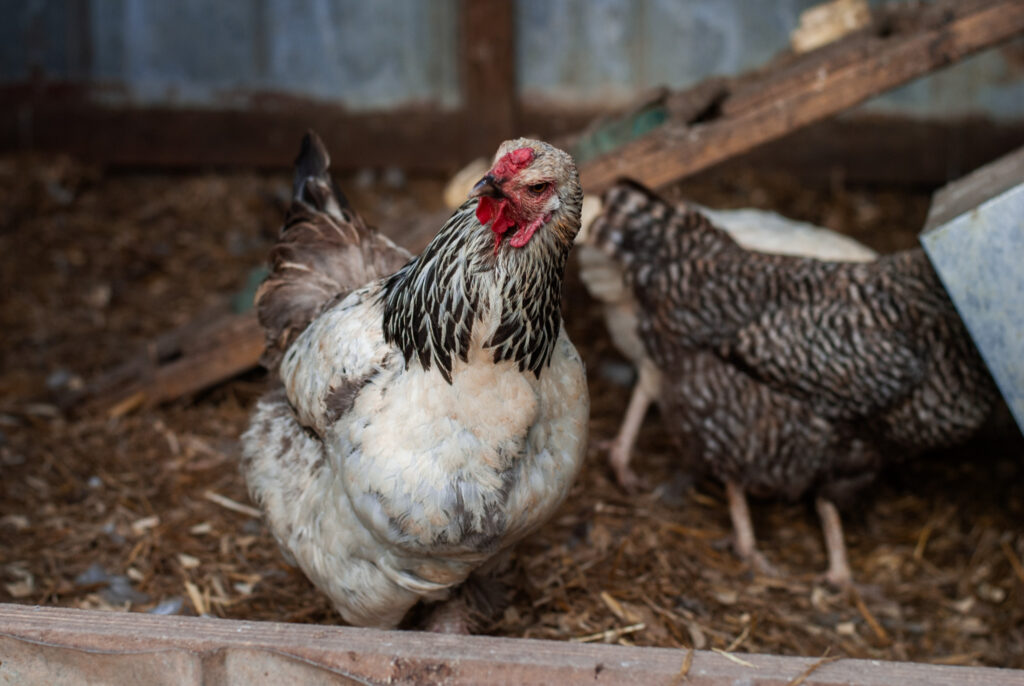
Why Are Peppers Hot?
Have you ever wondered why hot peppers, like red peppers or other spicy peppers, make your mouth feel like it’s on fire? It’s all because of an oil called capsaicin. Capsaicin is the secret ingredient that causes that burning sensation in your mouth.
When you eat spicy food, the capsaicin binds to special heat receptors in your tissue, called capsaicin receptors. These receptors normally detect temperature, so when capsaicin sticks to them, your brain thinks you’re eating something hot, even though it’s just the spice.
Interestingly, plants like peppers produce this oil mainly around their seeds, and some people believe this is a defense mechanism. The effects of capsaicin help protect the plant from insect and disease damage by making the hot food unappealing to bugs.
So, while we might enjoy the thrill of eating the spiciest peppers, insects definitely aren’t fans.
More Chicken Articles You’ll Love
- Raising Baby Chicks For Beginners
- Keeping Chickens
- How To Raise Ducks and Chickens Together
- Free Range Chickens
Can Chickens Taste Spicy Foods?
The heat in peppers isn’t just there to protect them from insects. It also helps keep mammals from eating them. When humans or other mammals eat spicy peppers, the capsaicin can cause some pretty uncomfortable side effects like diarrhea, stomach aches, and indigestion.
This reaction is actually a defense mechanism for the pepper plants because mammal stomach acid breaks down the seeds, making it hard for the plant to reproduce.
However, pepper plants do want to be eaten by wild birds. Unlike mammals, birds don’t have taste buds or taste receptors that recognize spicy foods, so they can eat peppers without any of the adverse effects.
Plus, birds help spread the seeds around when they digest and excrete them, allowing the plants to reproduce. This is why adding peppers to a chicken’s diet won’t bother them, even though it might make you sweat.
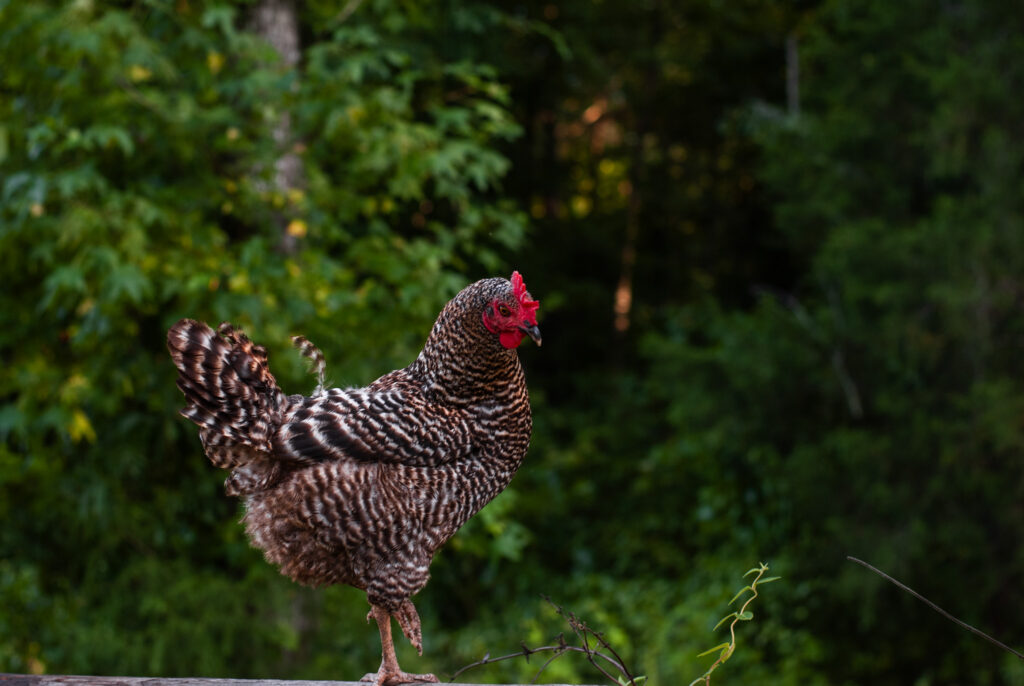
Benefits of Spicy Foods
Vitamins
Hot peppers can actually be great for your flock’s diet! They’re packed with essential nutrients like vitamin A and C, which are especially good for your chickens’ feathers, keeping them shiny and strong. Peppers also contain important minerals like potassium, iron, and calcium, which help with blood flow and overall health.
In fact, peppers have been known to reduce the occurrence of heart attacks in birds. This is particularly important because some chicken breeds are more prone to heart failure. So, adding a little bit of pepper to your chickens’ diet can provide a healthy boost and help keep them in shape.
Antibiotic
Feeding hot peppers to chickens, like red pepper flakes, can offer some impressive health benefits as a natural alternative to antibiotics. Some research suggests that red peppers have an antimicrobial effect, which can help protect chickens from bacterial infections.
This makes it a good idea to include them in your flock’s diet, especially during the winter when respiratory diseases are more common. Not only do red pepper flakes help maintain immune health, but they can also have a positive effect on the chickens’ microbiome. This is the good bacteria in their intestines that support their overall health.
By using peppers as a healthy treat and preventative measure, you can help strengthen your chickens’ immune systems without relying on antibiotic additives.
Egg Production
There are a lot of rumors out there that feeding chickens red pepper will increase their egg production. While it’s not proven that red pepper can make a chicken lay more eggs, since that depends mostly on their reproductive system, it can still have a positive impact on the eggs themselves.
Some research suggests that adding red pepper to chicken feed can improve the quality of the egg yolk, making it a rich, deep amber color instead of the pale yellow you usually see in grocery store eggs. A darker yolk often means better nutrition.
There’s also evidence that red pepper can increase the overall weight of the egg, giving you bigger, healthier eggs instead of small ones. So, while it might not lead to more eggs, it could definitely lead to better ones.
Intestinal parasites
Using red pepper in your chickens’ diet might be a great way to help prevent worms, even though it won’t actually treat them. Red pepper can support a healthy immune system by boosting the chickens’ natural microbiome, which plays a key role in keeping their guts in good shape.
Some people also claim that red pepper helps dispel intestinal worms in their chickens, but I couldn’t find solid research to back this up. Still, it seems like adding red pepper to their feed could be an extra help in preventing worms, making it a good addition to your flock’s diet as a preventative measure.
It may not be the best choice for worm treatment, but it could be a useful tool in keeping your chickens healthy.
Salmonella
Giving your chickens red pepper might be a good idea to help prevent them from carrying salmonella. Salmonella bacteria can be part of a chicken’s natural flora, meaning they can carry it without showing any signs of illness. In fact, chickens can even infect their eggs with salmonella before the shells form.
While salmonella won’t make your chickens sick, it can be passed on to humans, causing serious illness. Some research suggests that red pepper can help decrease the occurrence of salmonella in chickens.
The slight inflammation caused by red pepper supports the health of mucosal membranes, making the chickens less suitable hosts for the bacteria. This could be especially beneficial for backyard flocks or free-range birds, helping to ensure a salmonella-free chicken population and reducing the risk of passing the infection to people.
Clean Coop
Using hot pepper flakes in your chicken feed can be a smart way to keep rodents and other pests out of the chicken coop. Like I mentioned earlier, mammals don’t enjoy hot red pepper. It can cause them a lot of pain and discomfort for them.
Because of this, adding hot red pepper to your chickens’ feed can deter pests from eating it. Rodents and squirrels will avoid food with red pepper in it, and as a result, you’ll likely see fewer snakes around your coop, too. Snakes often show up looking for rodents, and if there are fewer of them around, the snakes will be less interested.
Plus, since snakes love to eat eggs, keeping them away also protects your chickens’ eggs from being snatched. Adding hot pepper flakes to your chicken feed is a great way to protect your flock and reduce health issues caused by pests. Check out my favorite feeders and supplies!
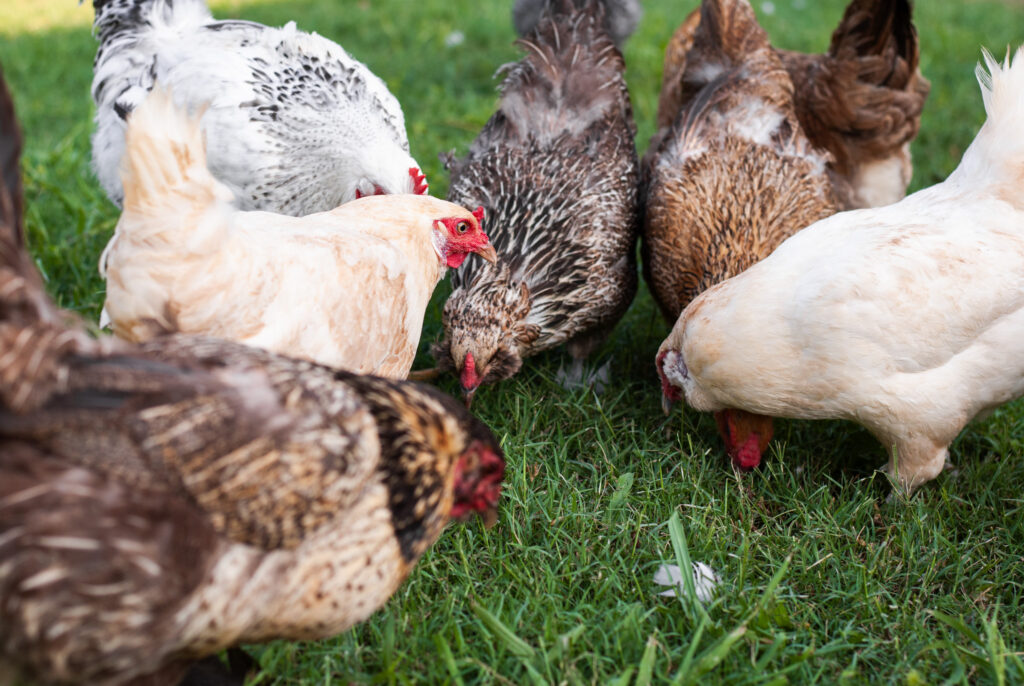
Potential Adverse Effects
There aren’t many cons to feeding hot pepper to your flock, but it’s important to be cautious. Some flock owners claim that hot pepper might upset a chicken’s stomach, though this is hard to prove since chickens can’t exactly tell us how they feel.
However, as with any food, feeding too much of it can have adverse effects, so it’s a good idea to monitor your flock for any issues. While ripe peppers are generally safe for chickens, be careful with unripe peppers and the green parts like stems, as they can contain solanine, a poisonous substance that can be harmful to chickens.
Flock owners should always make sure they’re offering a balanced diet and be cautious when feeding whole peppers to avoid any potential problems.
Other Beneficial Herbs
There are plenty of other herbs that can be beneficial for your chickens. For example, sage is known to help prevent internal parasites and build a healthy immune system, making it a great addition to their diet.
Basil is another good option. It supports their mucus membranes and can even help keep pests away from the coop.
Oregano is excellent for boosting the immune system and preventing illnesses, making it a healthy snack for your flock.
Giving parsley to your chickens can be a great idea, as it’s packed with benefits for their health. One of the key advantages of parsley is that it can improve blood vessel health, which helps promote better blood flow in your chickens. This can keep your flock in top shape, especially during times of stress or heat.
Plus, parsley is easy to add to their diet as a healthy snack. It’s a simple way to give your chickens a little extra boost!
And don’t forget rosemary, which is fantastic for improving respiratory health. Adding these herbs to your chickens’ routine can keep them healthy and thriving.
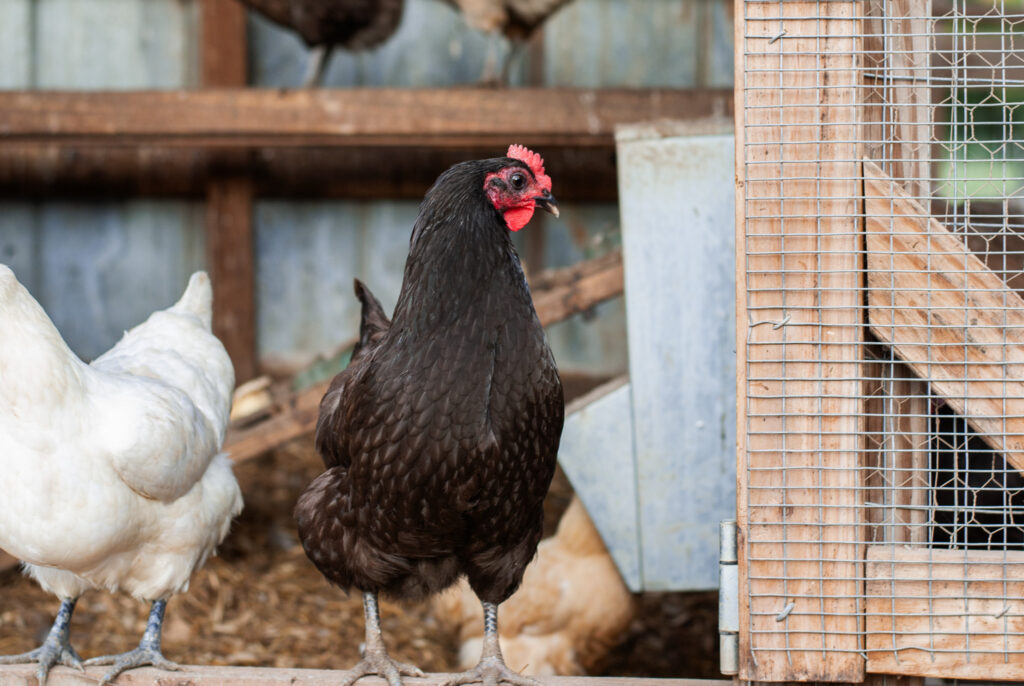
*This post may contain affiliate links which means I make a small commission at no extra cost to you. Read my full disclosure here.*
How Much Red Pepper Does a Flock Need
If you’re wondering the amount of red pepper you should be feeding to your chickens, there isn’t any concrete research to determine the exact amount. However, I generally add two tablespoons of red pepper per gallon of feed and mix it in well to coat the feed evenly.
Red cayenne pepper is ideal because it creates a nice powdery coating on the feed. But be cautious, too much cayenne pepper can irritate the respiratory system if you or your chickens inhale it.
Red pepper flakes are another good option, and I typically add about 1/4 cup of flakes per two gallons of feed. Just make sure to mix it in thoroughly. You can also experiment with the amount to find what works best for your flock, especially if you’re aiming to improve egg yolk color and quality.
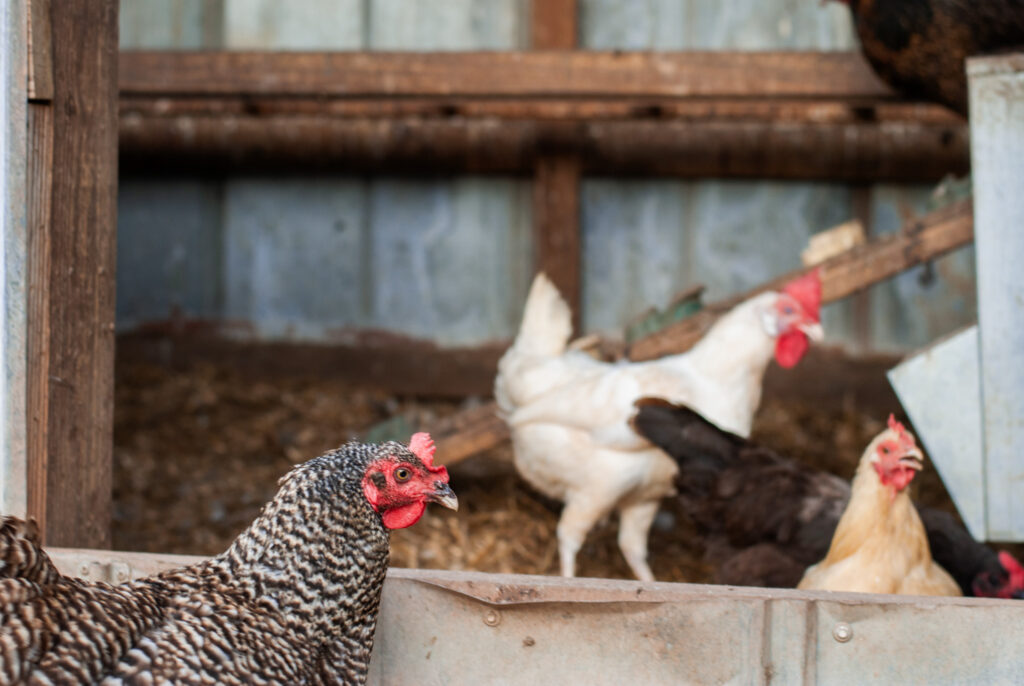
Can chickens Taste Spicy Food-FAQs
Can chickens taste spicy foods like humans do?
Nope! Chickens don’t have the same taste receptors that we do, so they don’t experience the burning sensation we feel when eating spicy foods.
Is it safe to feed my chickens spicy foods?
Yes, it’s safe! Spicy foods like red pepper won’t hurt your chickens, and they can even have some health benefits.
Will feeding my chickens spicy foods affect the taste of their eggs?
No, feeding spicy foods to your chickens won’t make their eggs taste spicy. The capsaicin in peppers doesn’t transfer to the eggs.
Can baby chicks eat spicy foods?
It’s generally best to wait until your chicks are a bit older before introducing any new foods, including spicy ones. Stick to their regular starter feed until they’re a few weeks old.
Do chickens prefer spicy foods over non-spicy foods?
Chickens don’t seem to have a preference either way since they can’t taste spiciness, so they’ll eat spicy foods just like they would anything else.
Can feeding my chickens too much spicy food harm them?
While spicy foods are safe, moderation is key. Feeding too much of anything can cause digestive upset, so it’s always best to mix it into their feed in small amounts.
Can I add hot sauce or other spicy condiments to their feed?
It’s better to stick with natural sources of spice like red pepper flakes or cayenne pepper. Hot sauce and other condiments may contain ingredients that aren’t good for chickens.
Can Chickens Eat Spicy Foods? Final Thoughts
In summary, while chickens can’t actually taste spicy foods the way we do, adding some spice to their diet can offer a variety of benefits. From boosting their immune system and egg quality to keeping pests away, red pepper can be a useful addition to your flock’s feed. Just be mindful of the amount you’re using and keep an eye on your chickens to make sure they’re handling it well. With a little bit of experimentation, you can find the right balance to help keep your chickens healthy and happy!
If you enjoyed this article on chickens, please share it!
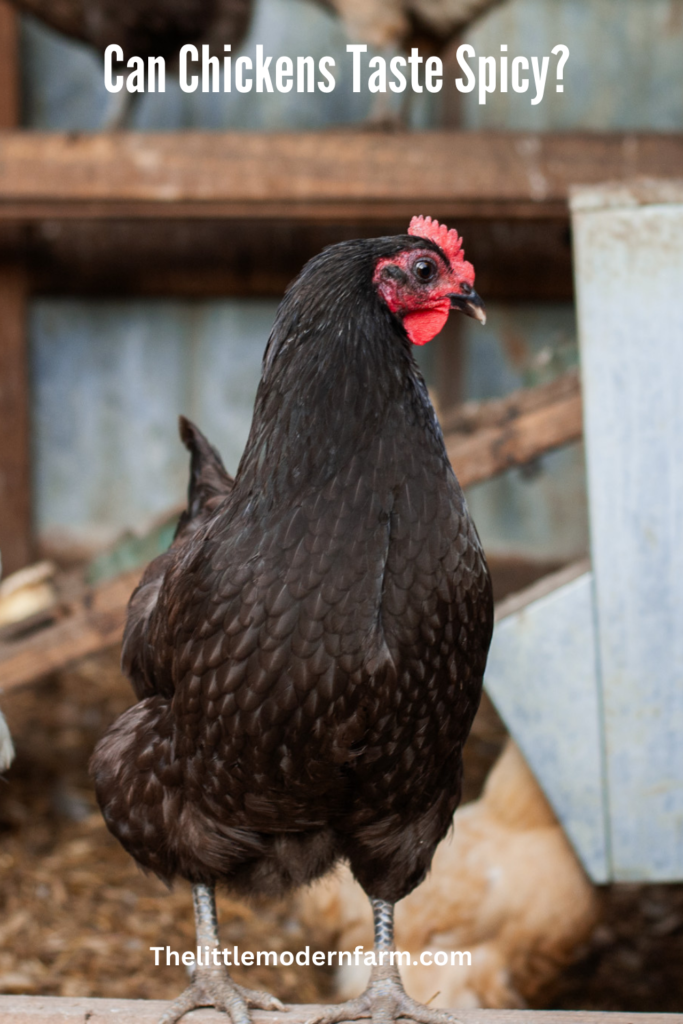
More From The Farm
Are Rhode Island Red chickens friendly? If you’re thinking about adding these birds to your small farm, you’re probably wondering how they’ll fit in with the rest of the flock and with you.
Rhode Island Reds are known for being hardy, dependable egg layers. They’re also pretty easy to care for, making them a great addition to any small farm. But what about their personality? Let’s take a look at what makes these chickens tick and whether they’ll be your newest flock members.
“All Scripture is God-breathed and is useful for teaching, rebuking, correcting and training in righteousness” 2 Timothy 3:16
[…] Can Chickens Taste Spicy? […]